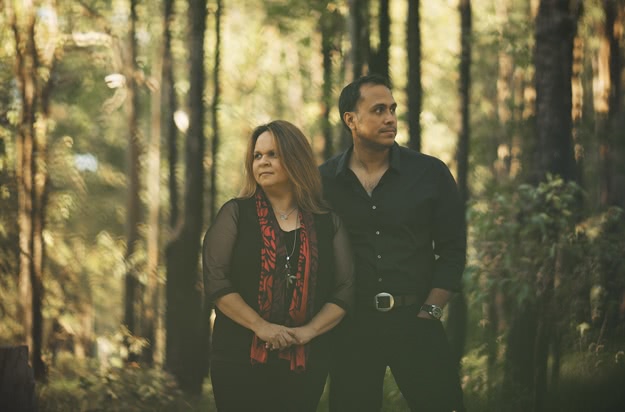Gina Williams sounds surprised to hear from me, though she is quick to assure me it is not because she has forgotten our interview. Rather, she has lately found herself to be a performer much in demand, and there are only so many hours in the day.
Hailing from Balladong in Western Australia, Williams and her musical partner, Guy Ghouse, have been involved in a remarkable pursuit over the last few years, bringing the highly endangered Noongar language back from the brink of extinction. Given the great lengths taken to eradicate the language in the first place, and the dwindling population that still speaks it, their endeavour is all the more urgent.
“The language was hunted down,” says Williams. She is passionate in her speech, and with good cause. “Children first, as part of Auber Neville [former Chief Protector of Aborigines in WA]’s policy of taking kids. They were moved all around, separated from families, and the language was hunted almost to extinction. If you consider now, we have less than 250 speakers left, and in my lifetime we’ve seen it go from 16 to 14 dialects. Anyone can do the math and see just how critically endangered it is. By a lot of official standards the language would already be considered extinct, but we know that isn’t true.”
Though Williams speaks sadly about the history of indigenous Western Australia, there is yet great hope that through her music, sung entirely in the Noongar language, a piece of Australia’s cultural history may be sustained across the entirety of the country.
“What I think is really interesting is how people have been responding, and not just because we’re dealing with something that’s really rare. People seem to understand that it’s really something quite beautiful. It truly comes from this country. There’s a lot of talk at the moment of identity, of ‘What is Australian culture?’ My observation is, the indigenous voice – not just here in Perth, but all indigenous languages – have a real part to play in informing our heritage. I think we all have the responsibility to learn the language of where we come from.”
Listening to Williams’ songs is curiously akin to listening to opera. At first glance there might not seem a strong corollary between Australian indigenous languages and, say, Turandot. But beyond the words themselves there exists another language, where the sentiment of the words – the essence, perhaps – instils the songs with emotions and meanings that transcend vocabulary. While the material that Williams and Ghouse performs is not traditional Noongar songs, the pulse of the language remains clear.
“A couple of things happened when I went overseas,” says Williams. “I was in London for a month and was offered this opportunity to sing. While I was there I thought, ‘Why not? I might just try a couple of these language songs as well.’ And people were very polite for my English songs, but when I sang in language it captured something. One bloke came up to me and said, ‘I have no idea what you were singing about, but I understood the heart of it.’ You don’t need to know the words. We all share passions, we all know what love and loss are. It doesn’t matter what language you express it in, it’s something we all share. That was a real turning point.
“I think what we do is deeply, deeply personal. People are often really keen to point out the differences between us. But when we’re singing in language, what’s really key in all of this is that it celebrates the things we have in common. I know that sounds like a bit of a cliché. But what we’ve discovered is that even though I’m singing a language that only a handful of people will understand, we’re actually not so different.”
Williams laughs, and then happily sighs. Quite clearly a project in which she has invested much time and energy, it is not only the responsibility of preserving the language that keeps her going, but the excited reception these songs have received. There is an almost fundamental connection between our contemporary cultural lives and the ancient languages of indigenous Australia, despite the paucity of exposure. Indeed, the word ‘noongar’ itself translates quite humbly to ‘human being’, and there are few things more communal than that.
“I can get a bit evangelistic about this,” Williams says. “But I think it’s such a beautiful language, so I get quite passionate about it. It has the rhythm of a heartbeat, and we’ve been blessed to have found such support from within the community. Not so long ago, people didn’t want to hear it. My mum grew up not being allowed to speak it, with the language being beaten out of her. So it’s not ancient history, this is still recent. We’re at a point now that every time an Elder dies, our hearts are in our throat because they’re like a library. We lose more of the language, lose more words. So I think we have a responsibility as artists to keep language alive.
“It’s kind of overwhelming, the response we’ve had. People are genuinely touched and genuinely connect, and that keeps the language moving. I’m more than happy to make friends with the entire world one gig at a time, if that’s how we have to do it. If that’s how this language is kept alive, then I’ll happily sing until the day I die.”
Gina Williams and Guy Ghouse will be playing at National Folk Festival 2015 alongside David Francey, Heartstring Quartet, Baka Beyond, All Our Exes Live In Texas and many more from Thursday April 2 – Monday April 6.

































